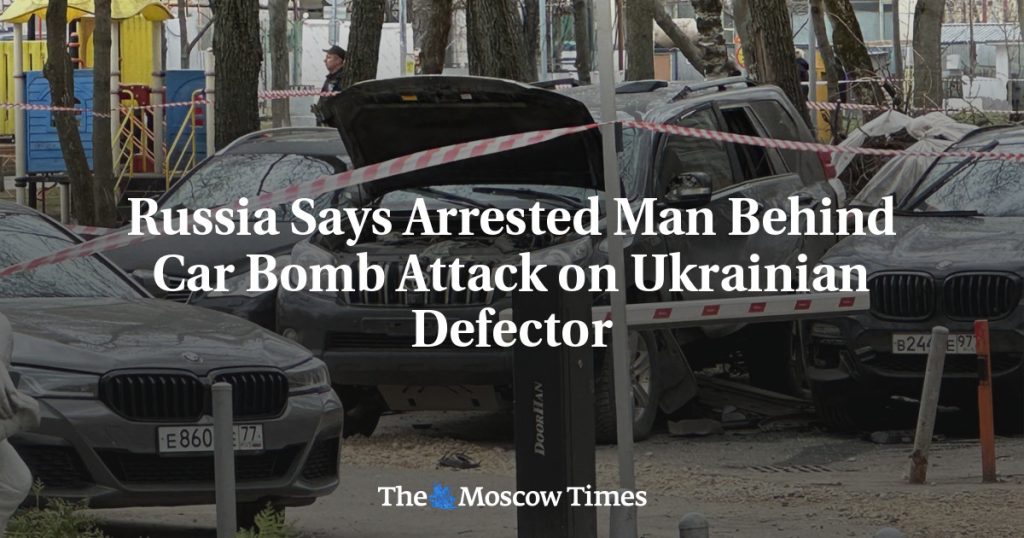The Federal Security Service (FSB) of Russia announced the arrest of a Russian man suspected of attempting to assassinate a former Ukrainian intelligence officer through a car bomb attack in Moscow. The targeted officer, Vasily Prozorov, was injured when an explosive device went off beneath his SUV last week. The FSB believes that the detained man, whose identity was not disclosed, planted the bomb with the intention of killing Prozorov, who had previously worked for Ukraine’s SBU security service. The agency stated that the suspect left for Ukraine following Russia’s military operation in the country and was recruited by an SBU employee in October 2023. He then returned to Russia in March this year, assembled the bomb, and carried out the attack after conducting reconnaissance on Prozorov’s location.
A video released by the FSB showed the detained man stating that he had resided in Ukraine since 2010 and was recruited by the SBU in November 2023, a month later than indicated in the agency’s formal statement. He mentioned that his mission was initially to spy on a Toyota Prado in Moscow but was later changed to building an explosive device under the direction of his handler. The man confessed to attaching the bomb to Prozorov’s car in the early hours of April 9. Russian investigators have opened a criminal investigation into the assassination plot, and the FSB is gathering additional evidence to charge the suspect with high treason, which could result in a life sentence.
Prozorov gained public attention in 2019 when he disclosed that he had spied on Ukraine’s SBU for Russia following the ousting of former Ukrainian President Viktor Yanukovych during the 2014 protests. Since the full-scale invasion of Ukraine by Russia in February 2022, several former Ukrainian officials who collaborated with Moscow have been targeted in assassination attempts within Russia and in Russian-occupied territories of Ukraine. These incidents underscore the ongoing tensions between Russia and Ukraine, with acts of retaliation and violence continuing to occur between individuals on both sides of the conflict.
The case of the attempted assassination of Vasily Prozorov highlights the complex web of espionage and hostility between Russia and Ukraine, as well as the dangers faced by individuals caught in the crossfire of these geopolitical tensions. The involvement of former intelligence officers from both countries in covert operations and acts of violence further exacerbates the already strained relations between the two nations. The emergence of assassination plots targeting individuals who have collaborated with opposing sides underscores the deep-seated animosity and distrust that exists between Russia and Ukraine, with violence being used as a means to settle political scores and advance strategic interests.
The detention of the suspect responsible for the attempted car bombing of Prozorov represents a significant development in the case, as Russian authorities continue to investigate the incident and gather evidence to support charges of high treason. The revelation that the suspect was recruited by the SBU and instructed to carry out the attack in Moscow sheds light on the extent of the espionage activities taking place between rival intelligence agencies and the risks faced by individuals who become embroiled in such covert operations. As the investigation progresses, further details may emerge regarding the motives behind the assassination attempt and the broader implications for diplomatic relations between Russia and Ukraine.
Overall, the recent events surrounding the attempted assassination of Vasily Prozorov underscore the ongoing conflict between Russia and Ukraine, with acts of violence and espionage continuing to shape the dynamics between the two nations. The arrest of the suspect marks a significant development in the case and could potentially lead to further revelations about the individuals and networks involved in the plot. As tensions persist and violence remains a tool of coercion in the geopolitical struggle between Russia and Ukraine, the risks faced by individuals working in intelligence and security services on both sides of the conflict are likely to increase, highlighting the complex and volatile nature of the ongoing crisis in the region.















